| Srl | Item |
| 1 |
ID:
126860
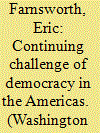

|
|
|
| 2 |
ID:
102164
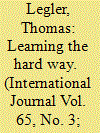

|
|
|
| 3 |
ID:
115428
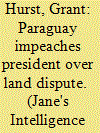

|
|
|
| 4 |
ID:
178127


|
|
|
|
|
| Summary/Abstract |
In Latin America and Southern Africa, norms on violence against women have developed with ups and downs, not simply in reaction to global norms, but sometimes even preceding global norm diffusion or surpassing it in terms of scope, framing and binding character. The classic global-to-local account with a single source of norm creation cannot capture these dynamics. Including the regional level in a dynamic model of norm diffusion enables us to understand the changing contents of a norm and to acknowledge transregional agency. We show (1) how norm contestation is an ongoing, multidirectional and polycentric process; (2) how the regional level opens up opportunities for feminists and femocrats; and (3) under which conditions regional norms can be both more progressive than global ones and more adapted to regional needs, and, in turn, are thus able to strengthen the ‘global’ norm.
|
|
|
|
|
|
|
|
|
|
|
|
|
|
|
|
| 5 |
ID:
104547
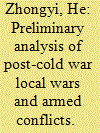

|
|
|
| 6 |
ID:
110512
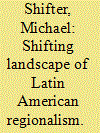

|
|
|
|
|
| Publication |
2012.
|
| Summary/Abstract |
"Brazil's rise, coupled with the diminished influence of the United States and the increasingly salient global role of China, has reshuffled the kaleidoscope of regional organizations. . . ."
|
|
|
|
|
|
|
|
|
|
|
|
|
|
|
|
| 7 |
ID:
066777
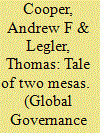

|
|
|
| 8 |
ID:
107113
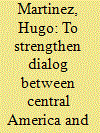

|
|
|
|
|
| Publication |
2011.
|
| Summary/Abstract |
International Affairs: Mr. Minister, how do you assess the present level of Russian-Salvadoran ties both in the sphere of bilateral relations and within the framework of the international agenda?
Hugo Martinez: First of all, I would like to point out that my visit to Russia last October was of great importance for the relations between our two countries. It provided an opportunity to discuss with my Russian counterpart Sergei Lavrov not only prospects for Russian-Salvadoran relations but also Russian-Central American ties.
As for our bilateral relations, we defined the new promising lines of our cooperation, thus expanding the existing opportunities. We discussed ways of increasing our trade, expanding tourist exchanges between Russia and Salvador and attracting Russian investment in the Salvadoran economy.
|
|
|
|
|
|
|
|
|
|
|
|
|
|
|
|
| 9 |
ID:
178791
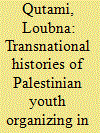

|
|
|
|
|
| Summary/Abstract |
This article explores the transnational histories that have conditioned Palestinian youth organizing in the United States from the 1950s to the present day. It examines the organizational vehicles of earlier generations of activists such as the Organization of Arab Students (OAS) and the General Union of Palestinian Students (GUPS) to trace the formation of the U.S. chapter of the transnational Palestinian Youth Movement (PYM). It argues that in the Oslo and post-Oslo eras, which severed the Palestinian diaspora from the national body politic and the rich Palestinian organizational histories of the pre-1993 period, the lessons of their forerunners are instructive for PYM’s new generation of organizers. The article posits that transnational connections have profound implications for localized U.S. political organizing and that contemporary Palestinian youth organizing is part of a historical continuum. Drawing on oral history and scholar-activist ethnographic methods, the article situates contemporary youth organizing in its transnational and historical contexts.
|
|
|
|
|
|
|
|
|
|
|
|
|
|
|
|
| 10 |
ID:
134581
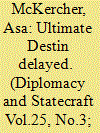

|
|
|
|
|
| Summary/Abstract |
Until Canada joined in 1990, the issue of its membership in the Organisation of American States bedevilled Canadian foreign policy, which many observers saw as a decisive test of Ottawa’s interest in Latin America. Under the Liberal government of Lester Pearson, prime minister from 1963 to 1968, and the stewardship of his secretary of state for External Affairs, Paul Martin, Canada seemed poised to join OAS. But a mixture of foreign and domestic factors—including American intervention in the Dominican Republic, Cuba’s isolation within the hemisphere, and growing Canadian nationalism—ruined this initiative. Using the Pearson government’s policy toward the OAS as a lens through which to explore the direction of Canadian foreign relations in the 1960s, this analysis also examines competing views of Canada’s place in the world.
|
|
|
|
|
|
|
|
|
|
|
|
|
|
|
|
| 11 |
ID:
084179


|
|
|